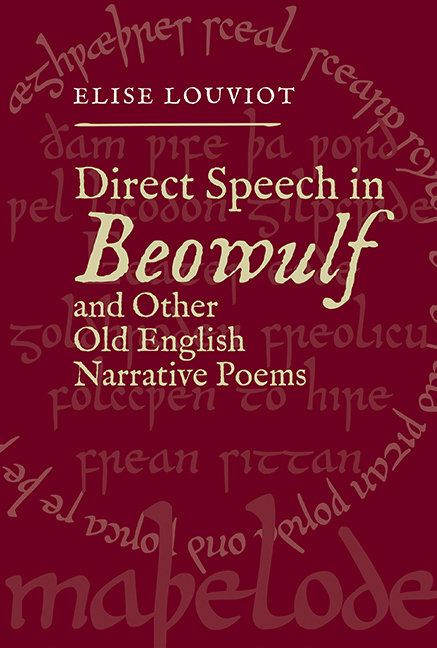Book contents
- Frontmatter
- Contents
- List of Figures
- Acknowledgements
- Introduction
- 1 The Form of Direct Speech
- 2 The Content and Context of Direct Speech
- 3 A Lack of Subjectivity?
- 4 Archetypal Subjectivity
- 5 A Problem with Voices
- 6 A Problem with Point of View
- 7 Impossible Irony
- Conclusion
- Bibliography
- Index
- Anglo-Saxon Studies
- Frontmatter
- Contents
- List of Figures
- Acknowledgements
- Introduction
- 1 The Form of Direct Speech
- 2 The Content and Context of Direct Speech
- 3 A Lack of Subjectivity?
- 4 Archetypal Subjectivity
- 5 A Problem with Voices
- 6 A Problem with Point of View
- 7 Impossible Irony
- Conclusion
- Bibliography
- Index
- Anglo-Saxon Studies
Summary
Wenn man sich das bild der erzählenden stabreimdichtung der Germanen vergegenwärtigt, so tritt sogleich die rede der handelnden und leidenden personen als hellbeleuchteter gegenstand hervor.
Direct speech is one of the most striking features of Old English narrative poems. Quantitatively speaking, it is hard to miss as it often represents more than one-third of a complete poem and sometimes more than half. Mostly, though, what strikes the modern reader is the imposing, even cumbersome, weight of speeches in Old English poetry. Several features obviously contribute to that impression: speeches can be very long and formal, they are systematically preceded by a conventional inquit usually taking up at least one whole line of poetry and they are often devoid of an answer, and sometimes even of an addressee.
Early twentieth-century critics, whose views of Direct Speech were informed by classical rhetoric and the modern novel, often found those characteristics puzzling, if not downright disappointing. They criticised Old English poetic speeches for being unable to serve characterisation and the progression of action. One would be hard-pressed to find similarly negative assessments of Old English poetics in contemporary scholarship. Nowadays, critics are much more sensitive to the specificities of early medieval compositions and no one would fault an Old English poem for not matching classical or modern aesthetic criteria – at least not consciously.
Surprisingly, though, that change of attitude has not led to a reassessment of Direct Speech in Old English poetry. To this day, the most complete treatments of the issue remain Heusler's 1902 paper and Richman's 1977 dissertation. Even more surprising, some of the old preconceptions regarding the nature and function of Direct Speech – namely that it is intrinsically connected to characterisation and the expression of individualised points of view – still seem to be lurking behind recent scholarship. In particular, the assumption that Direct Speech must serve characterisation through the representation of distinct voices remains intact.
What has changed is that nowadays, when scholars venture an opinion on the handling of Direct Speech – which only rarely occurs – they are more likely to praise the poets for achieving successful characterisation than to blame them for failing to do so.
- Type
- Chapter
- Information
- Publisher: Boydell & BrewerPrint publication year: 2016



